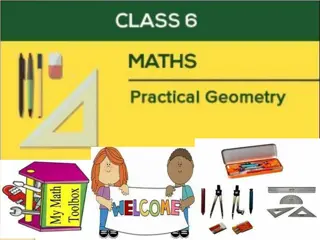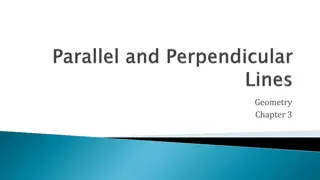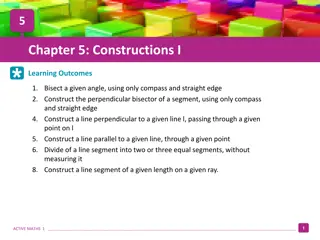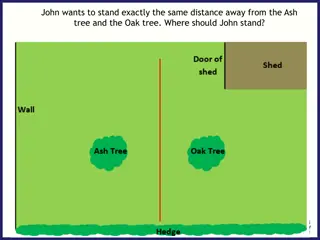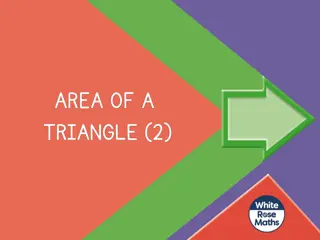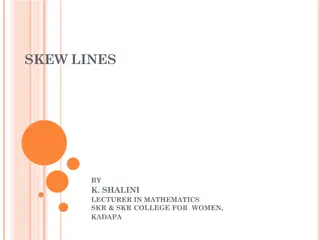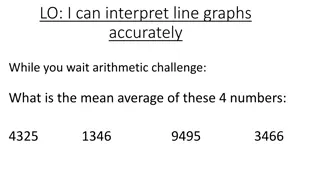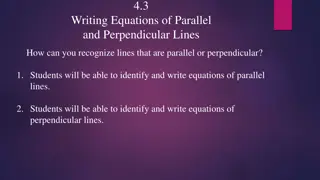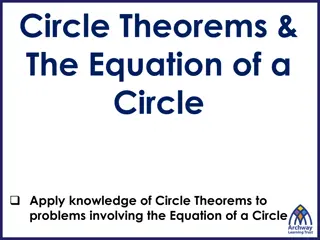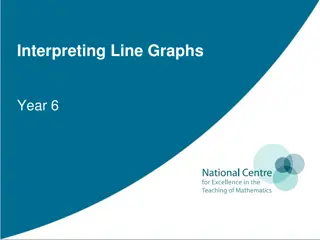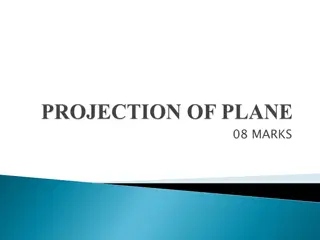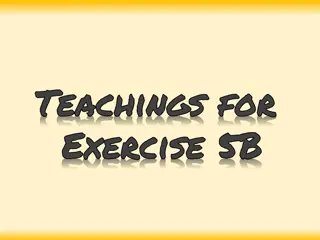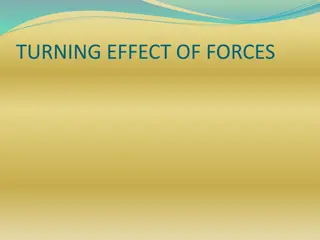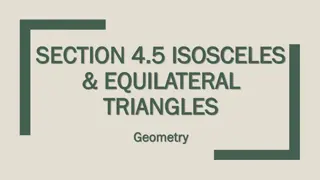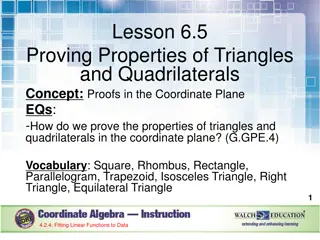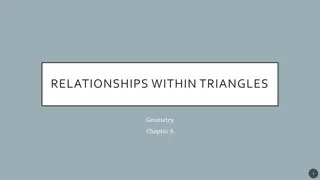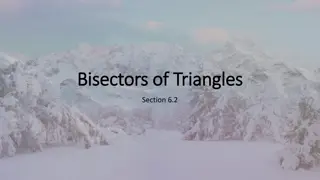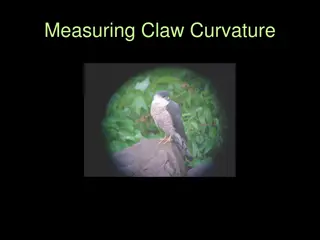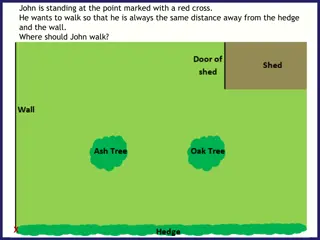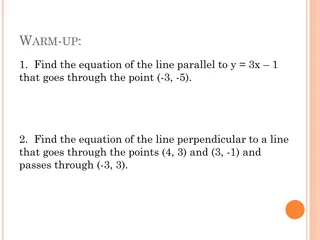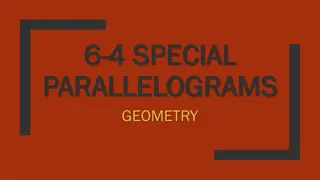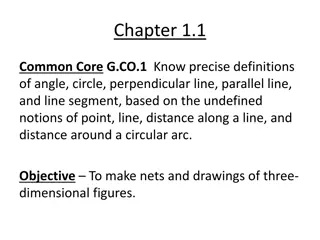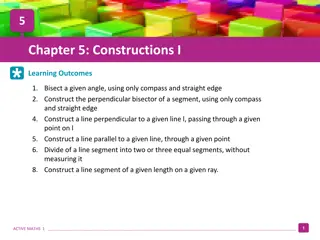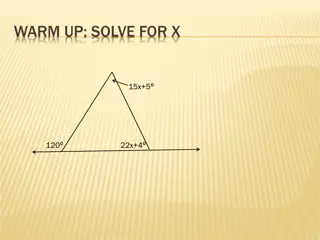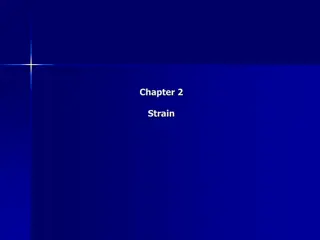Introduction to Geometry Tools: Circle, Line, Perpendicular, and Angles
This content introduces essential geometry tools like the circle, line, perpendicular, and angles, with details on their construction and applications. Learn about rulers, compasses, protractors, and more for drawing shapes and measuring lengths and angles. Discover how to construct circles, line se
2 views • 12 slides
Comprehensive Overview of Geometry Chapter 3 Concepts
Dive into the fundamentals of lines, planes, parallelism, and angles in Geometry Chapter 3. Explore topics such as identifying lines and planes, understanding parallel and perpendicular lines, and recognizing angle relationships formed by transversals. Discover the properties of parallel lines, tran
0 views • 42 slides
Geometric Constructions using Compass and Straight Edge
Learn how to bisect angles, construct perpendicular bisectors, draw perpendicular and parallel lines, divide line segments equally, and more using only a compass and straight edge in geometry. Follow step-by-step instructions with illustrations to master fundamental constructions.
2 views • 11 slides
Forces Affecting Air Movement: Pressure Gradient Force and Coriolis Force
The pressure gradient force (PGF) causes air to move from high pressure to low pressure, with characteristics including direction from high to low, perpendicular to isobars, and strength proportional to isobar spacing. The Coriolis force influences wind direction due to the Earth's rotation, making
0 views • 20 slides
Geometric Constructions and Perpendicular Bisectors
Explore geometric constructions involving equidistance, perpendicular bisectors, and circle drawing using compasses. Learn how to find the midpoint between two points, determine the path to stay equidistant from two objects, and construct perpendicular bisectors accurately. Enhance your understandin
2 views • 11 slides
Geometry Worksheets - Area of Shapes and Triangles
Explore different shapes and triangles to calculate their areas using squares as units. Practice identifying bases, perpendicular heights, and solving for areas of triangles in a fun and interactive worksheet.
1 views • 13 slides
Understanding Skew Lines and Planes in 3D Geometry
Explore the concepts of skew lines, parallel lines, perpendicular lines, and planes in 3D geometry through real-life examples and equations. Learn about the shortest distance between skew lines and solve problems related to their applications.
1 views • 46 slides
ASTM D3786/D3786M-18 Standard Test Method for Bursting Strength of Textile Fabrics
This standard test method, ASTM D3786/D3786M-18, specifies the procedure for determining the bursting strength of textile fabrics using a diaphragm bursting strength tester. The test involves clamping the specimen over an expandable diaphragm and applying pressure until the fabric ruptures. The burs
0 views • 16 slides
Understanding Line Graphs for Time Interpretation
Enhance your skills in interpreting line graphs accurately to grasp the concept of time representation. Explore topics like perpendicular lines, key time learnings, position estimation on a timeline, reading scales, and identifying divisions. Test your knowledge with challenges related to significan
0 views • 26 slides
Understanding Parallel and Perpendicular Lines
Students will learn to identify and write equations of parallel and perpendicular lines by understanding the relationship between slopes. Parallel lines have the same slope, while perpendicular lines intersect to form right angles. Through examples and explanations, students will gain the skills to
0 views • 12 slides
Key Points of Concurrency in Triangles
Understand the essential facts about points of concurrency within triangles. Learn about the Incenter located inside the triangle, the Centroid as the center of mass, and the Circumcenter as the point of concurrency of perpendicular bisectors. Memorize the characteristics and significance of these i
2 views • 10 slides
Constructing Perpendiculars: Shortest Distance to a Point
Learn how to find the shortest distance from a point to a line, ensuring the path taken is efficient and direct. By constructing a perpendicular from the point to the line, you guarantee the shortest possible route, creating a right angle with the line. Explore the process of constructing perpendicu
2 views • 17 slides
Understanding Circle Theorems and Equations of Circles
Explore circle theorems and equations of circles in geometry, including concepts like opposite angles in cyclic quadrilaterals, angles on a straight line, and important theorems like the perpendicular bisector of a chord passing through the center of a circle. Learn how to apply these theorems to fi
0 views • 12 slides
Understanding Line Graphs: Year 6 Lesson Overview
This document provides an introduction to interpreting line graphs for Year 6 students. It covers key concepts, reviews essential skills, explores precise mathematical vocabulary, and includes lesson clips on right angles and perpendicular lines. The journey through the lesson involves a focus on pe
0 views • 26 slides
Understanding Plane Surfaces in Engineering Drawings
Exploring the concept of plane surfaces in technical drawings, this informative content covers the definition, characteristics, and positioning of planes in space relative to projection planes. It also delves into the projections of various plane surfaces parallel, perpendicular, and inclined to pri
0 views • 9 slides
Understanding Forces and Friction on Inclined Planes
Explore the concept of forces and friction on inclined planes, focusing on the terminology and calculations involved. Learn how to resolve forces parallel and perpendicular to the plane, split gravity components, and consider normal reactions. Practice problems included to facilitate understanding.
0 views • 9 slides
Exploring Symmetry in the Alphabet: Rotation and Reflection Symmetries
Discover how rotation and reflection symmetries play a role in the alphabet, with most letters exhibiting some type of symmetry. Explore rotational symmetries both in and perpendicular to the plane, as well as symmetries across horizontal and vertical axes. Learn about the concepts of rotational sym
0 views • 13 slides
Understanding the Turning Effect of Forces
The turning effect of forces is explained through the concept of moments, where the moment of a force is calculated as the product of the force and the perpendicular distance from the pivot point. This principle is essential in understanding how forces can cause objects to rotate or turn. Explore ex
0 views • 26 slides
Understanding Isosceles and Equilateral Triangles in Geometry
Exploring the properties and theorems related to isosceles and equilateral triangles in geometry. Discover concepts like the congruence of legs and angles, the relationship between sides and angles, and the bisector of the vertex angle in an isosceles triangle. Explore examples with detailed solutio
0 views • 12 slides
Proofs in Coordinate Plane: Triangles & Quadrilaterals
Explore how to prove the properties of triangles and quadrilaterals utilizing coordinates, slopes, and distances in the coordinate plane. Learn about different types of triangles and quadrilaterals, key concepts like parallel and perpendicular lines, and the distance formula to establish geometric t
0 views • 34 slides
New Recommendations for Insulin Injection Technique and Needle Length - Guided by Expert Advice
The new recommendations emphasize using a 4mm needle for insulin injections to reduce the risk of incorrect administration. This needle length is suitable for children, adolescents, thin adults, and even obese patients. The guidelines also highlight the importance of perpendicular insertion of the n
0 views • 53 slides
Understanding Perpendicular and Angle Bisectors in Geometry
Explore the concepts of perpendicular and angle bisectors in triangles through visuals and theorems. Learn how to identify, utilize, and apply these bisectors to solve problems involving segments and angles within triangles. Enhance your understanding of bisectors with examples and step-by-step expl
0 views • 46 slides
Understanding Circumcenters in Triangles
Dive into the concept of circumcenters in triangles - learn how to locate them, understand their significance, and explore practical applications through examples and visual explanations. Discover the relationship between perpendicular bisectors, points of concurrency, and circumcenters in geometry.
0 views • 18 slides
Understanding Craniosynostosis: Premature Fusion of Cranial Sutures
Craniosynostosis is a pathological condition resulting from premature fusion of cranial sutures, leading to deformities in the cranial vault and base. It affects skull growth and brain development, with closure of sutures and fontanelles occurring by adulthood. Historical insights by Otto and Vircho
0 views • 74 slides
Mastering Claw Curvature Measurement Technique
Learn how to measure claw curvature using a step-by-step technique involving drawing chords, perpendicular lines, and measuring angles with a protractor. Practice the method on various bird claws such as Belted Kingfisher, Atlantic Puffin, Common Eider, Greater Black-backed Gull, and Great Blue Hero
0 views • 9 slides
Exploring concepts of equidistance and angle bisector in geometry
Explore the concepts of equidistance and angle bisectors in geometry through practical examples like determining the path for John to walk equidistant from a hedge and a wall, understanding the ideal flight path for a plane to land, constructing angle bisectors, and verifying constructions for accur
0 views • 23 slides
Understanding Ratios and Line Segments
Explore the concepts of ratios in relation to line segments, with examples of finding points that divide segments in given ratios. Learn how to determine equations of parallel and perpendicular lines, and apply these concepts to solve problems. Dive into practical scenarios involving wallet bills an
0 views • 12 slides
Understanding Pressure: Force, Area, and Application
Pressure is a fundamental concept in physics, defined as the force acting perpendicular to an object's surface area. This article explores what pressure is, how to calculate it, and provides examples of its application in everyday scenarios. Learn about the relationship between force and area, the f
0 views • 16 slides
Exploring Properties of Parallelograms, Rhombuses, and Rectangles
Delve into the theorems and examples related to the properties of parallelograms, rhombuses, and rectangles. Understand concepts such as diagonals in rhombuses, perpendicular diagonals in parallelograms, and congruent diagonals in rectangles. Learn to identify these shapes based on specific criteria
0 views • 11 slides
Geometry Definitions and Postulates Exploration
Explore precise definitions of key geometric terms like angle, circle, perpendicular line, parallel line, and line segment, as well as essential postulates. Understand the concepts of points, lines, distances, and three-dimensional figures through nets, drawings, and visual representations.
0 views • 25 slides
Geometric Constructions: Mastering Compass and Straight Edge Techniques
Explore the art of geometric constructions using only a compass and straight edge. Learn to bisect angles, construct perpendicular bisectors, draw lines perpendicular to given lines, create parallel lines, divide line segments equally, and more. Equip yourself with the necessary skills and technique
0 views • 11 slides
GCSE Constructions and Loci Techniques
Explore a comprehensive guide to GCSE constructions and loci by Dr. J. Frost, covering topics such as triangle constructions, perpendicular bisectors, angle constructions, and polygon construction using basic tools like a straight edge and compass. Learn essential skills for precise geometric drawin
0 views • 35 slides
Geometry Fundamentals: Theorems and Concepts Explained
Explore essential concepts in geometry such as solving equations, perpendicular transversal theorem, triangle exterior angle theorem, angle sum theorems, polygon classification, and naming polygorgons. Learn about the interior and exterior angles of triangles and why they add up to specific measurem
0 views • 21 slides
Understanding Forces and Vectors in Statics with Air Balloon Models
Explore the world of forces and vectors in statics through the model of a hot air balloon. Learn about vectors of negative magnitude, zero, addition, subtraction, parallel and perpendicular components, and multiplying by a scalar. Discover how to find components and the resultant force of multiple f
0 views • 17 slides
Understanding the Porter Governor and Instantaneous Centre Method
The Porter Governor is a modification of the Watts Governor, involving a central load attached to the sleeve. The Instantaneous Centre Method analyzes the equilibrium of forces acting on the link BD by considering the instantaneous center I located at the intersection of PB produced and a line throu
0 views • 11 slides
Understanding Deformation and Strain in Engineering
Deformation occurs when a force is applied to a body, causing changes in its shape and size. Normal strain refers to the elongation or contraction of a line segment per unit length, while shear strain is the change in angle between two originally perpendicular line segments. Cartesian strain compone
0 views • 6 slides
